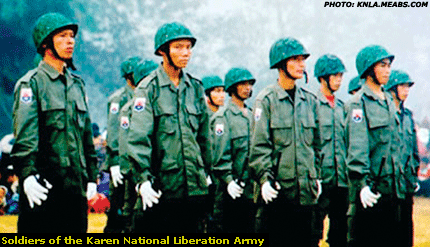A Soldier's Duty
(Page 2 of 3)

In the last decade, other political developments have weakened the KNU. Neighboring
Moreover, the “gentleman’s agreement” proved less than gentlemanly. Though fighting did cease in the two or three months following the
“We do not actively engage Burmese soldiers because of the peace talks,” said one of the soldiers of Battalion 101. “We try to keep away from them, but they always find us and attack.”
According to Saya Lay, the SPDC has slowly chipped away at Karen-controlled areas in recent months by increasing its presence and continuing to engage rebel forces.
“The ceasefire talks are a good way to work toward peace, but they [SPDC] must honor their agreements,” said another soldier of Battalion 101. “We are now losing more and more of our territory,” he added. “They are saying one thing and doing another.”
Despite increased aggression by government forces, Karen rebels have continued to avoid engaging them. “Our leaders have ordered us not to break our promise, even if they [SPDC] break theirs,” said Saya Lay, adding that this is not always possible when government troops launch a direct assault.
“For me, I don’t want to keep away when I see them,” said Saya Lay.
« previous 1 | 2 | 3 next page »
